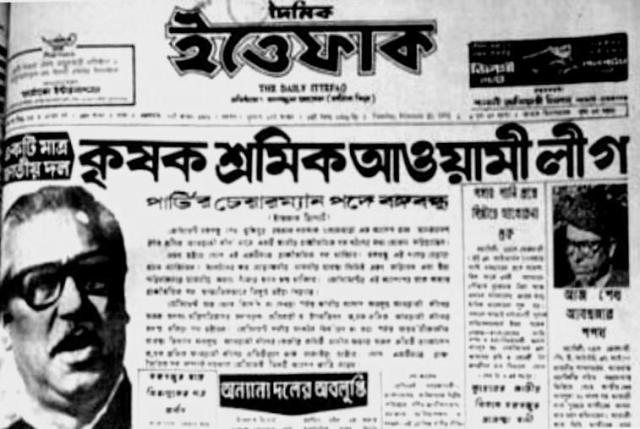Translated version of my previous article named “Bakshal” Which was published in my Book
A grueling 9 months later the country earned its freedom. Bangladesh was born as an independent and sovereign state. Soldiers returned to their barracks. The elections were dominated by the Awami League who set about shaping their government. And so the rebuilding process began. Steps were taken to reshape the administration, a constitution was written and established. But side by side the tug of war for power and the need to realise selfish aspirations began plaguing the country. Terrorism, hooliganism, thievery and mugging became daily occurrences. Restoration and rehabilitation was promised in the poster but it was all in tatters behind the scenes. Usurping collaborative democracy, one party rule was established.
The final nail in the coffin was the relentless Mujahids who were dubbed ‘BAKSAL’. Sheikh Mujib’s lack of administrative skills, attempt to handle state affairs with one blind hand, abolishing multidimensional democracy without the consent of the people whilst stretching the ever growing distance between them and his government, not to mention strangling democracy along the way inevitably led to Sheikh Mujib’s downfall. It is never wise to try and do too much of something, for the result will always be bleak. Every task, however small or insignificant it may be, has a purpose and way it needs to be executed. One needs to acknowledge its purpose before following the correct procedures to execute it. As such it can be argued that every task serves a purpose and is dependent on a unique method. On January 25th 1975 the 4th amendment bill was introduced in parliament which spoke about the ‘only’ political party in Bangladesh and suggested that the country be ran by a government formed by one particular party only. The bill also instructed that all others newspapers in Bangladesh be discontinued apart from a couple of papers ran by the opposition party, and a couple managed by the government. This “bill” consequently withstood and passed in parliament. That is the legacy of Awami League and Sheikh Mujib’s parliamentary revolution.
Bangladesh as a result suffered from political crisis. Sheikh Mujibur Rahman installed himself as the chairman of BAKSAL, proclaiming himself as the solitary leader of the only political party in Bangladesh. Every other political party was banned.The peoples fundamental rights, their right to speech was mugged from them. Every single newspaper save only 4, was banned. In simple words he assumed power as Bangladesh’s on and only Shahenshah (the grand king). Reverting to medieval ‘kingdom systems’ he declared himself absolute and the people as his “subjects”. His minions meanwhile had already turning the country upside down with unspeakable acts of horror, creating an atmosphere of fear and foreboding overall. The people’slips were clasped shut. The Rakkhi Bahini’s statutory powers were elevated and there were covert operations being conducted to eradicate the military.
But the people’s misery did not end there as there even further radical political changes took place. The people were already suffering from a lack of food and felt vulnerable from insufficient clothing. The price of sarongs went up from 3 taka to 15 taka, 5 times the original amount. A portion of rice used to cost 0.75 taka in 1972 but by 1974 it stood at 10-12 taka, nearly a thousand percent increase in prices. A portion of salt stood at a 100 bucks. In these uncertain times when Sheikh Mujib was asked about the current economic state and the famine, he roared, “a group of leeches are sucking us dry”. Who were the leeches that he was referring to? It is clearly deducible that the members and leaders of the then most influential group were the ‘leeches’ Sheikh Mujib so wisely referred to. Speaking of the salt, whenever foreign rations came in they were instantly trafficked out and over the border, where there was no one keeping watch. One day Sheikh Mujib came to ask, “7 million people have woollen fleeces, where did mine go?” Many couldn’t afford to put food on their tables even once a day.
The horrifying famine forced people to demand, “Bhat de haramjada noile manchitro khaiya falamu, which roughly translates to “Give us rice you bastard or else we’ll eat the map.” The government neglected their socio-economic duties, instead tended to all their personal needs with vigour and haste. The shameless activities of the BAKSALs had left the country hurt and bruised. However in 1975 in a covert military coup which brought an end to BAKSAL-i torture, General Ziaur Rahman emerged from behind the veil as the shining light which signalled a new era for the country.
Long live bravery, long live ‘Bir Uttom’ Ziaur Rahman.





